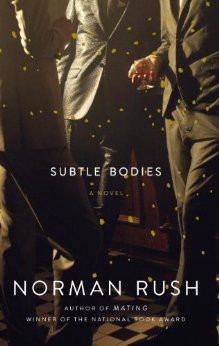Norman Rush, "Subtle Bodies"

I am someone who is no longer well-disposed toward most literary fiction, having reached an age where there is very little left for me to learn about life from every fucking arrogant introvert who thinks the made-up people into whose mouths he puts platitudes and funny things he once heard someone else say are interesting enough that total strangers will devote hours of their day to spending time observing a pretend universe that is probably just as boring as the one from which they are attempting to divert themselves with a book. I mean, it’s fine when you’re in the first flush of youth, but the reason most people gravitate toward history and other non-fiction as they grow older is that they already know how life is going to play out, and they have no interest in seeing how a bunch of kids who dropped a large chunk of change to make connections in Iowa are going to manipulate an assembly of precious archetypes into articulating profundities which are neither new nor particularly incisive, although they may feel like both depending on how well camouflaged they are with up-to-the-moment references to brands and products. So, even with his age and background, I was already skeptical when I picked up Norman Rush’s Subtle Bodies, and prepared myself to give it ten or so pages before my innate dismissiveness provided me with the permission to toss it aside and say, “This book does not speak to me.” Surprise: I read it in two sittings. (At 256 pages this is much less of an accomplishment than it would be with Rush’s previous works, but it is still something.) And you know what? I am baffled by what to say about it. Is it a great book? Is it a bad book? I have no idea, although the fact that I could barely put it down argues for something closer to the former than the latter. I can see it driving a certain kind of person crazy, and I can see being the best thing another kind of person has read all year. It feels both terribly authentic and bizarrely contrived, often simultaneously. The briefest of plot summaries give it a Big Chill vibe, but it goes much deeper than that suggests, and what you come away from it with also probably depends on what kind of person you are. I found it ultimately depressing and indicative of the futility of most relationships, but that is probably not what Rush intended. Is this a recommendation? On balance, it is. I’m still not sure I understood it, but I was carried along with it so intensely that I have to believe that the fault is mine. You should probably pick it up and decide for yourself. Sorry if that wasn’t super helpful!
